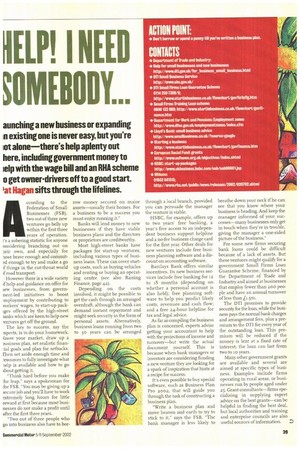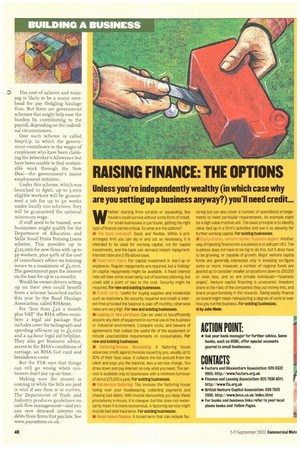FIELP! I NEE
Page 39

Page 40

If you've noticed an error in this article please click here to report it so we can fix it.
30MEBOD 1 •
aunching a new business or expanding in existing one is never easy, but you're lot alone—there's help aplenty out here, including government money to ielp with the wage bill and an RHA scheme o get owner-drivers off to a good start. at Hagan sifts through the lifelines.
According to the Federation of Small Businesses ( F S B), two out of three new ventures go belly up within the first three years of operation. t's a sobering statistic for anyone onsidering branching out on heir own, and especially for hose brave enough and commited enough to try and make a go f things in the cut-throat world if road transport.
However there is a wide variety dhelp and guidance on offer for tew businesses, from governnent.led initiatives to boost .mployment by contributing to vorkers' wages, to start-up pack. Iges offered by the high-street )anks which are keen to help new rentures get off the ground.
The key to success, say the nyerts, is to do your homework. (now your market, draw up a )usiness plan, set realistic finanial goals and plan for setbacks. Chen set aside enough time and :esources to fully investigate what lelp is available and how to go about getting it.
"Think hard before you make the leap," says a spokesman for the FS B. "You may be giving up a secure job and you'll have to work extremely long hours for little reward at first because most businesses do not make a profit until after the first three years.
"Two out of three people who go into business also have to bor
row money secured on major assets—usually their homes. For a business to be a success you must enjoy running it."
Banks will lend money to new businesses if they have viable business plans and the directors or proprietors are creditworthy.
Most high-street banks have packages for start-up ventures, including various types of business loans. These can cover startup costs, such as buying vehicles and renting or buying an operating centre (see also Raising Finance, page 42).
Depending on the costs involved, it might be possible to get the cash through an arranged overdraft, although the bank can demand instant repayment and might seek security in the form of personal assets. Alternatively, business loans running from two to 30 years can be arranged
through a local branch, provided you can persuade the manager the venture is viable.
HSBC, for example, offers up to two years' free banking, a year's free access to an independent business support helpline and a no-fee business charge card for the first year. Other deals for new ventures include free business planning software and a discount on accounting software.
Barclays Bank offers similar incentives. Its new business services include free banking for 12 10 18 months (depending on whether a personal account is also held); free planning software to help you predict likely costs, revenues and cash flow; and a free 24-hour helpline for tax and legal advice.
As far as compiling the business plan is concerned, experts advise getting your accountant to help with the projections of income and turnover—but write the actual document yourself. This is because when bank managers or investors are considering funding a new venture they are looking for a spark of inspiration that hints at a recipe for success.
It's even possible to buy special software, such as Business Plan Pro 2002, that will guide you through the task of constructing a business plan.
"Write a business plan and move heaven and earth to try to stick to it," says the FSB. "The bank manager is less likely to
breathe down your neck if he can see that you know where your business is heading. And keep the manager informed of your successes—many businesses only get in touch when they're in trouble, giving the manager a one-sided picture of the business."
For some new firms securing bank loans could be difficult because of a lack of assets. But these ventures might qualify for a government Small Firms Loan Guarantee Scheme, financed by the Department of Trade and Industry and aimed at businesses that employ fewer than 200 people and have an annual turnover of less than ii.5rn.
The DTI promises to provide security for the loan, while the business pays the normal bank charges and arrangement fees, plus a premium to the DTI for every year of the outstanding loan. This premium will be reduced if the money is lent at a fixed rate of interest; the loan can last from two to io years.
Many other government grants are available and several are aimed at specific types of business. Examples include firms operating in rural areas, or businesses run by people aged under 25. Grant consultants—firms specialising in supplying expert advice on the best grants—can be helpful in finding the best deal, but local authorities and training and enterprise councils are also useful sources of information. The cost of salaries and training is likely to be a major overhead for any fledgling haulage firm. But there are government schemes that might help ease the burden by contributing to the payroll, depending on the individual circumstances.
One such scheme is called Step-Up, in which the government contributes to the wages of employees who have been claiming the Jobseeker's Allowance but have been unable to find sustainable work through the New Deal—the government's major employment initiative.
Under this scheme, which was launched in April, up to 5,000 eligible workers will be guaranteed a job for up to 5o weeks under locally run schemes; they will be guaranteed the national minimum wage.
If staff need to be trained, new businesses might qualify for the Depaitment of Education and Skills' Small Firms Training Loans scheme. This provides up to £125,000 for new firms with up to 5o workers, plus 90% of the cost of consultancy advice on training issues to a maximum of £5,000. The government pays the interest on the loan for up to 12 months.
Would-be owner-drivers setting up on their own could benefit from a scheme launched earlier this year by the Road Haulage Association, called RHAone.
For "less than L20 a month plus VAT" the RHA offers members a legal aid package that includes cover for tachograph and speeding offences up to i5,000 and a 24-hour legal aid helpline. They also get business advice, access to the RHA's conditions of carriage, an RHA fuel card and breakdown cover.
But the FS B says that things can still go wrong when customers don't pay up on dine, Making sure the money is coming in while the bills are paid is vital if any firm is to survive, The Department of Trade and Industry produces guidelines on cash flow management—and you can now demand interest on debts from firms that pay late. See www.payontime.co.uk.




























































































































































